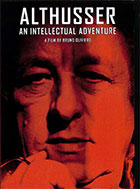
Althusser: An Intellectual Adventure 2016
Distributed by Icarus Films, 32 Court St., 21st Floor, Brooklyn, NY 11201; 800-876-1710
Produced by Luc Martin-Gousset
Directed by Bruno Oliviero
DVD, color and b&w, 55 min.
High School - General Adult
Activism, Communism, Economics, History, Government, Labor, Labor Movement, Political Science, Social Movements, Social Sciences, Sociology, Philosophy, Marxism, France
Date Entered: 07/03/2018
Reviewed by Joseph Baumstarck, Jr., University of Louisville, Southern Baptist Theological Seminary, Ivy Tech Community CollegeAlthusser is an intellectual biography discussing the influence of Louis Althusser. It places Althusser as one of the foremost Communist philosophers of the 20th century. Clearly shown is the tremendous influence Althusser exerted over many of the socialist leaders who influenced and governed large portions of the world during the latter half of the century. The film is composed of commentary and interviews of Althusser, some of the students he influenced who are now academic leaders in universities and government officials, and acquaintances. These interviews show the frustrations Althusser had with activists who attempted to impose Marxist principles they did not fully understand in ways that had not been clearly thought out. Althusser’s vexations become increasingly clear throughout the film when many of these ill-conceived and short-lived experiments fail. Most trying for Althusser was the blame that opponents assigned to Marxist principles when these political experiments, which usually were actually democratic socialism, did not even reflect Marxism, as Althusser understood it. A long-term Marxist academic, Althusser saw his role as a theorist, exemplar, and teacher who could provide others with a solid intellectual basis in Marxism which they could then use in actual practice to establish Marxism in a practical way. With the collapse of the Soviet Union and the increasing capitalism being adopted by China, Althusser became the main Marxist theoretician advocating for Communism on a national and worldwide basis.
Althusser was a resident of France and taught in French universities, but did not maintain consistent membership in any of the communist parties. Frequently at odds with communist party bosses throughout Europe, Althusser did not see membership in a particular communist party as significant as his theoretical work on Marxist thought. Lack of specific membership gave Althusser the ability to cross national communist party lines and advocate for a worldwide communism independent of modern nation states and political parties. Too academic for general public acceptance, too cantankerous for political party leadership, and too eccentric for acceptance in elite society Althusser found himself relegated to public obscurity, but readily available for academic purposes which suited him just fine.
Eventually Althusser’s chaotic life resulted in multiple mental hospital admissions and public notoriety when he killed his wife during a bout of psychiatric instability. Accepting a hurriedly arranged, shady plea agreement which kept him from a murder conviction, Althusser spent the rest of his life in inactive obscurity. A complex man who lived in the three interconnected circles of philosophy, communist party ideology, and mental illness Althusser’s main legacy is the separation of Marxism as a theoretical study from the existing communist parties.
This film is recommended because despite the subtitle, this film does little to allow the audience to understand the complex nature of Althusser’s intellectual journey or the impact he has had in the last half of the 20th century. Mostly consisting of interviews of a variety of individuals connected by commentary the viewer is hard pressed to understand Althusser’s philosophy. Further the choppy manner and highly selective way in which these interviews are arranged fail to develop a biographical story line of Althusser’s life. Nonetheless, given the obscurity surrounding Althusser as a public figure and the lack of knowledge most people have about his life and significance this film provides a starting point for developing an understanding of Althusser, his significance, and his work. I suspect this film will see limited use in most settings, but it provides good secondary resources for libraries and educational institutions with programs in history, social sciences, politics, and economics.